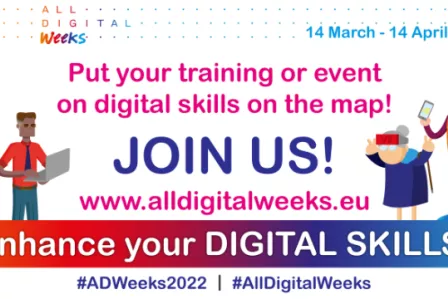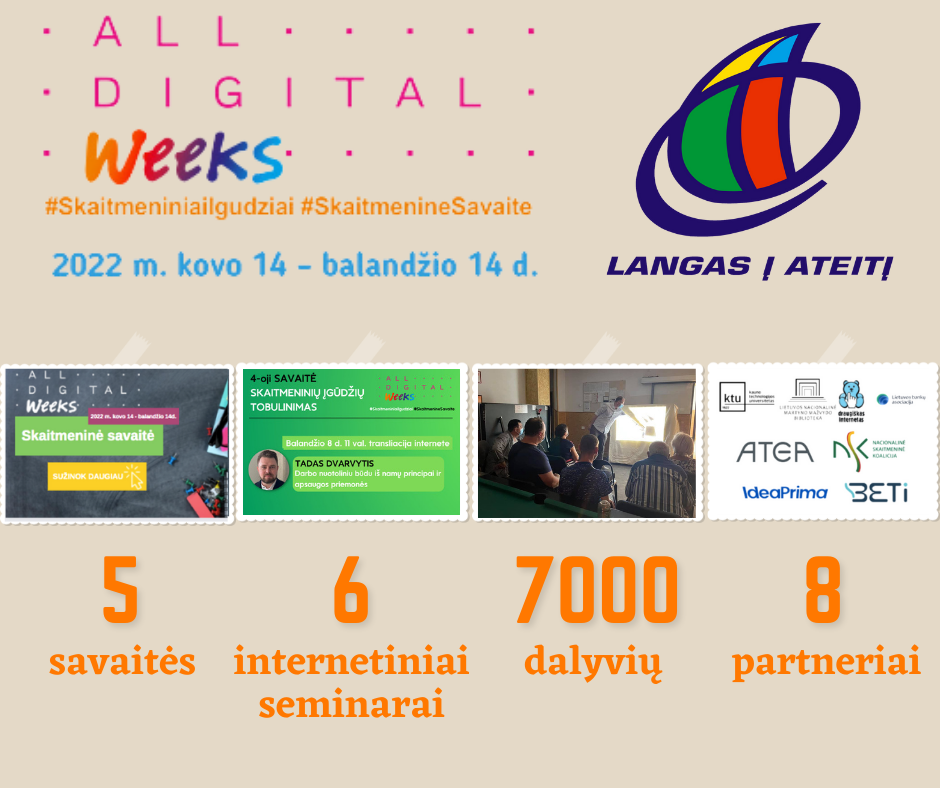To help people of all ages striving for the best digital knowledge, the Lithuanian Safer Internet Centre (SIC) consortium partner Langas į ateitį coordinated All Digital Week(s) in Lithuania. All Digital Week is an annual European campaign running since 2010 to improve digital skills in several European countries. This year in Lithuania, the campaign expanded from one to five weeks from 14 March to 14 April 2022.

During each week of the campaign, Lithuanian citizens were invited to check their digital literacy skills, to improve their digital knowledge by participating in self-study classes and to participate in six webinars supported by Kaunas University of Technology. The promotional activities on social media reached around 66,000 users and attracted 7,000 participants to the events at public libraries and online.

Week one: What are my digital skills?
During the first week, participants had the opportunity to self-assess their digital skills and discover knowledge gaps that can hinder their work and quality of life. One of the tools offered for testing was developed by Langas į ateitį, together with the other tool, DigSat test, based on the European Digital Competences Framework for Citizens, developed by the Joint Research Centre and the European Commission.
Week two: cybersecurity knowledge and safe online behaviour
The second week, which took place from 21 to 25 March, was organised in cooperation with the Lithuanian Safer Internet Centre. In addition to the self-study material, three online events were organised during the week, discussing what risks could occur in our and our children’s online environment and how to handle them, and how to improve our attentiveness to online frauds.
Week three: STEM skills
The topic of the third week was STEM skills - Science, Technology, Engineering, and Mathematics (STEM) strands. This area is becoming increasingly promising in such a fast-changing technological world. During this week, the Baltic Educational Technology Institute was invited to an online debate dedicated particularly to young girls starting a career path in STEM or considering starting a career in STEM disciplines, and to support them with the choice of their future studies.
Week four: critical thinking and disinformation
During the last week, in addition to self-learning classes, employees were invited to join the lecture Principles and protective measures for working from home. This topic has yet not lost its relevance and thus attracted quite a big number of attendees. Another webinar explored ways of providing emotional health support online. The final week was dedicated to the topic of critical thinking and why it is particularly important in these times of ramping disinformation and misinformation. Every day, we are confronted with propaganda and fake news. In order to counteract the abundance of misleading information, it is important to first be able to identify it.
About All Digital Week
All Digital Week is an annual initiative to develop digital skills across Europe. It aims to encourage citizens to better understand modern technologies, to discover the benefits they generate and to learn how to use them effectively in their daily lives.
More information on Digital Week 2022 activities in Lithuania can be found at www.epilietis.lt, and other European events and initiatives for All Digital Week are available at www.alldigitalweek.eu.
Find out more about the work of the Lithuanian Safer Internet Centre, including its awareness raising, helpline, hotline and youth participation services – or find similar information for Safer Internet Centres throughout Europe.
To help people of all ages striving for the best digital knowledge, the Lithuanian Safer Internet Centre (SIC) consortium partner Langas į ateitį coordinated All Digital Week(s) in Lithuania. All Digital Week is an annual European campaign running since 2010 to improve digital skills in several European countries. This year in Lithuania, the campaign expanded from one to five weeks from 14 March to 14 April 2022.

During each week of the campaign, Lithuanian citizens were invited to check their digital literacy skills, to improve their digital knowledge by participating in self-study classes and to participate in six webinars supported by Kaunas University of Technology. The promotional activities on social media reached around 66,000 users and attracted 7,000 participants to the events at public libraries and online.

Week one: What are my digital skills?
During the first week, participants had the opportunity to self-assess their digital skills and discover knowledge gaps that can hinder their work and quality of life. One of the tools offered for testing was developed by Langas į ateitį, together with the other tool, DigSat test, based on the European Digital Competences Framework for Citizens, developed by the Joint Research Centre and the European Commission.
Week two: cybersecurity knowledge and safe online behaviour
The second week, which took place from 21 to 25 March, was organised in cooperation with the Lithuanian Safer Internet Centre. In addition to the self-study material, three online events were organised during the week, discussing what risks could occur in our and our children’s online environment and how to handle them, and how to improve our attentiveness to online frauds.
Week three: STEM skills
The topic of the third week was STEM skills - Science, Technology, Engineering, and Mathematics (STEM) strands. This area is becoming increasingly promising in such a fast-changing technological world. During this week, the Baltic Educational Technology Institute was invited to an online debate dedicated particularly to young girls starting a career path in STEM or considering starting a career in STEM disciplines, and to support them with the choice of their future studies.
Week four: critical thinking and disinformation
During the last week, in addition to self-learning classes, employees were invited to join the lecture Principles and protective measures for working from home. This topic has yet not lost its relevance and thus attracted quite a big number of attendees. Another webinar explored ways of providing emotional health support online. The final week was dedicated to the topic of critical thinking and why it is particularly important in these times of ramping disinformation and misinformation. Every day, we are confronted with propaganda and fake news. In order to counteract the abundance of misleading information, it is important to first be able to identify it.
About All Digital Week
All Digital Week is an annual initiative to develop digital skills across Europe. It aims to encourage citizens to better understand modern technologies, to discover the benefits they generate and to learn how to use them effectively in their daily lives.
More information on Digital Week 2022 activities in Lithuania can be found at www.epilietis.lt, and other European events and initiatives for All Digital Week are available at www.alldigitalweek.eu.
Find out more about the work of the Lithuanian Safer Internet Centre, including its awareness raising, helpline, hotline and youth participation services – or find similar information for Safer Internet Centres throughout Europe.
- online safety media literacy disinformation digital skills
Related content
- < Previous article
- Next article >












